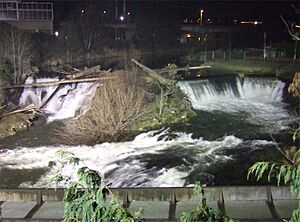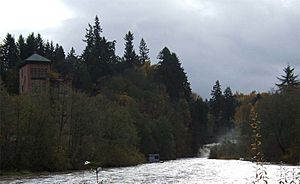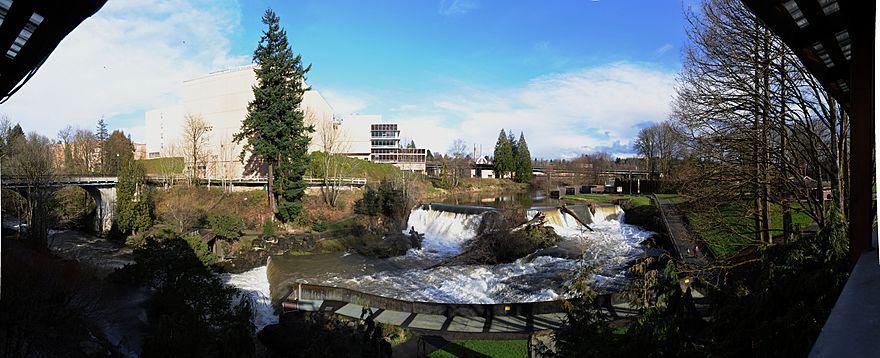Tumwater Falls facts for kids
Quick facts for kids Tumwater Falls |
|
|---|---|

Upper Tumwater Falls, pictured in 2007
|
|
| Lua error in Module:Infobox_mapframe at line 185: attempt to index field 'wikibase' (a nil value). | |
| Location | Tumwater, Washington, U.S. |
| Coordinates | 47°00′53″N 122°54′17″W / 47.0147°N 122.9046°W |
| Total height | 82 ft (25 m) |
| Number of drops | 2 |
| Longest drop | 25 ft (7.6 m) |
| Watercourse | Deschutes River |
| Average flow rate |
400 cu ft/s (11 m3/s) |
The Tumwater Falls are a beautiful series of waterfalls on the Deschutes River. You can find them in Tumwater, Washington, in the United States. These falls are special because they are close to where the river flows into Budd Inlet, which is part of Puget Sound near Olympia.
Contents
How Tumwater Falls Was Formed
The Tumwater Falls were created over a very long time. After the last Pleistocene ice age ended, huge glaciers melted and left behind a lot of rock and dirt. The Deschutes River then began to cut its way through this material. Eventually, the river reached very hard volcanic rock. As the water flowed over this hard rock and down towards Puget Sound, it formed the waterfalls we see today.
A Look at Tumwater Falls History
Tumwater Falls is a very important place in the history of Western Washington. It was the location of the first European settlement in the area, called New Market. The falls were also home to the famous Olympia Brewing Company for many years, though that company is no longer there.
Power from the Falls
In 1890, a company called Olympia Light and Power built a dam and a power plant at the falls. This plant used the force of the water to create electricity. It was built even before the well-known Snoqualmie Falls power plant near Seattle. The electricity from Tumwater Falls helped power a streetcar that ran between Olympia and Tumwater, along with other things. The dam, which is still there, helps create a strong flow of water for the power plant.
Helping Salmon Travel
For a long time, the Tumwater Falls were too high for salmon to swim past. This meant salmon could not reach the upper parts of the Deschutes River to lay their eggs. But in 1952, the Washington Department of Fisheries built a special path called a fish ladder. This ladder allows salmon to swim around the falls and reach a new fish hatchery built just above them. Before this, it was very unusual for a river system in Puget Sound to not have salmon swimming upstream past the falls.
Tumwater Falls Park Today
In 1962, the Olympia Brewing Company gave 15 acres of land around the falls to the Olympia-Tumwater Foundation. This gift led to the creation of Tumwater Falls Park. Today, the park is a popular spot, with about 200,000 people visiting it every year to enjoy the waterfalls and the beautiful surroundings.
 | James Van Der Zee |
 | Alma Thomas |
 | Ellis Wilson |
 | Margaret Taylor-Burroughs |



